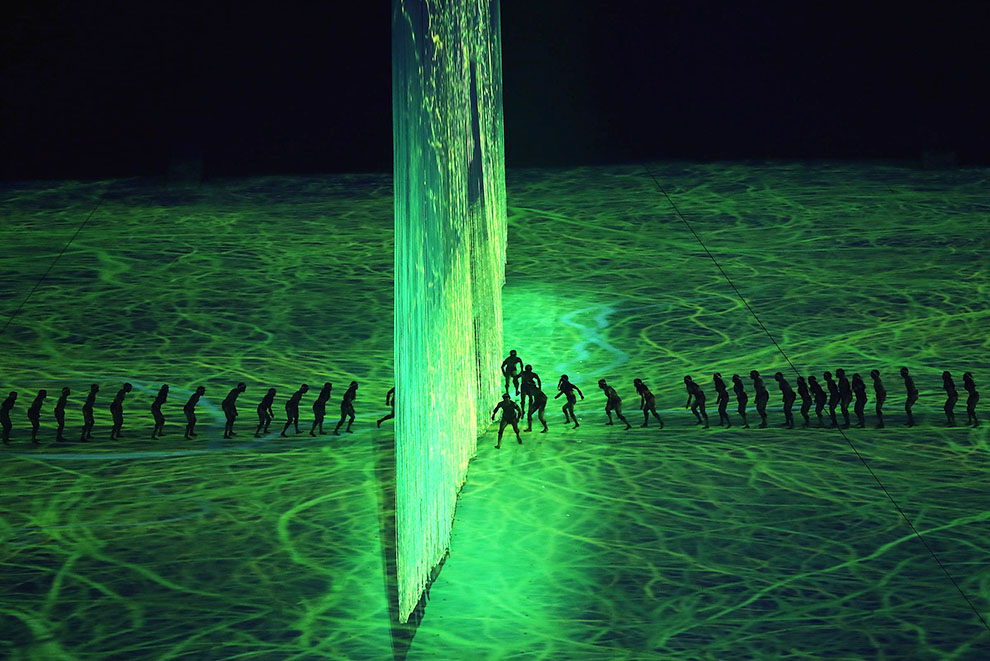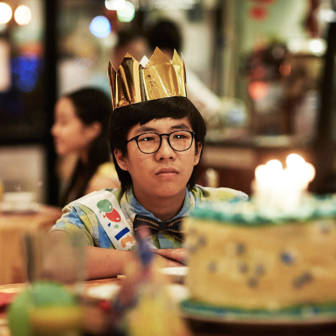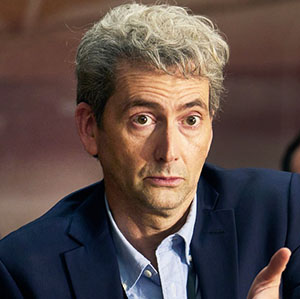We’ve become accustomed to a marked bipolarism in the mood leading up to the Olympics. Scenes of excited anticipation alternate on our television screens with reports of homeless people and ugly neighbourhoods being swept out of the way to make room for construction, and of budget blow-outs, unfinished facilities and security risks. But with the Rio games, the bipolarity has reached a new level of intensity. As Gerard Whateley commented on ABC’s Offsiders, Rio has endured “the roughest ever ride from vote to games.” On Friday night’s edition of The Drum, presenter Tracey Spicer speculated on whether, after a winning bid proclaimed as “flawless” by the IOC in 2009, Rio was at risk of delivering the worst games ever.
One Drum panellist took the view that all this disaster talk was partly a consequence of too many journalists, desperate for a story, milling round the city for a couple of weeks in advance of the games. Some stories do desperately need to be told, though. When human body parts and large quantities of raw sewage are washing up on the beach where some of the aquatic events are to take place, this tells of dire problems for the residents of the city, quite aside from the risk to visiting athletes. A banner greets arrivals at the airport with “Welcome to Hell,” a place where police and firefighters don’t get paid. Yet paramilitary police employed by the government appear in ominous numbers to keep hostile onlookers from extinguishing the Olympic torch on its journey through the city, or otherwise spoiling the party.
If the public mood has swung to the opposite end of the spectrum since that flawless bid in 2009, it is because circumstances have changed for the people of Rio de Janeiro. In a scathing article published last week, Latin American journalist Antonio Castillo described an atmosphere of “corruption and calamity” brought on by hardline government policies under the leadership of interim president Michel Temer, who took power last May in what was effectively a coup against the left-wing government led by Dilma Rousseff. Rousseff was the successor to president Luiz Inácio Lula da Silva, whose leadership saw such a dramatic economic recovery that by the time of the bid Brazil had become the world’s fifth-largest economy. Since the coup, this recovery has been dramatically reversed. Two months ago, the acting governor of Rio, Francisco Dornelles, warned of an imminent collapse in public security, health, education, transport and management.
Following the successful opening ceremony on Saturday, the prevailing story in the Australian media is that the negativity has been “swept away.” It’s the conventional pattern, repeated through the games in Sydney, Athens, Beijing and London. The staple ingredients – the spectacular electronics of the floorshow, the celebrity performances, the appearance of legendary Olympic veterans, the entry parade of athletes, the lighting of the torch – amount to a fail-safe formula. “Let the games begin.” Euphoria and celebration will henceforth prevail.
All this is stirring stuff, and it is hardly surprising that it replaces the ugly stories of catastrophic pollution, political corruption and local poverty in the minds of the two billion or more spectators watching on television. So, does the generic structure of the opening ceremony, however brilliantly interpreted, inevitably amount to a sophisticated and prodigiously expensive international propaganda exercise?
Well, that’s not quite how it worked this time around, in spite of the pronouncement by Carlos Nuzman, president of the Rio 2016 Olympic organising committee, that “the Olympic dream is now a wonderful reality.” Nuzman, himself an Olympic veteran, was addressing the assembly of athletes whose entry parade had taken up the preceding two hours, culminating in the arrival of the small refugee team and the huge contingent from Brazil. The collective mood at this point was as high as it gets, and he was riding on it. “This marvellous city is the perfect city,” he continued. “Let’s live the dream together… We stand to deliver history.”
He spoke as if the tide of a darker reality was already in retreat, but it surged back only minutes later when Michel Temer rose to give his welcome. Anticipating a hostile reception, Temer had made his way into the stadium late and unannounced, but ceremony required his involvement, and there was no avoiding the moment. There was subdued booing, some whistling, but more than anything a sense of frigidity in the live audience, as pervasive as the excitement generated by the athletes.
If the Rio Olympics stand to deliver history, it will be the history of a broken dream. But that is exactly how it should be. Perhaps this is a turning point in the modern Olympic tradition, a point at which the wider public may learn to develop a double consciousness about what they are witnessing.
One of the delusions of the Olympics is that they already accommodate the full spectrum of awareness about the human condition, celebrating the peaks of individual achievement and national pride while paying special honour to those who become heroes by winning out against adversity. Following Nuzman’s address, IOC president Thomas Bach presented the Olympic laurel to Kipchoge Keino, the Kenyan track and field athlete who started out as a barefoot runner and went on to win gold medals at the Mexico City and Munich Olympics. Keino now works with orphaned children in a sports training and education centre in Kenya. He arrived in the stadium, running, surrounded by children dressed in white guiding white paper kites like those made by his pupils at home. His acceptance speech, with its call for the basic needs of all children to be met throughout the world, was a model of directness and simplicity. “We come into the world with nothing,” he said. “We leave the world with nothing.”
Keino’s work is real and enduring, but such moments of sentimental engagement with a mass public are not. The projected scenes from his school in Kenya were soon forgotten as scores of carnival figures took over the floor of the stadium. Will all those spectators who wiped the tears from their eyes at the entry of ten athletes from the refugee team remember that there are hundreds of thousands more where they came from, or be concerned about where these few individuals are going back to when all this is over? And what about those competitors from the “People’s Democratic Republic of Korea”? Do they have sleepless nights in the athletes’ village, tormented by fears of what may happen on their return home if they fail to make the medal tally?
Dual consciousness involves holding two contradictory orders of reality in sustained relationship. If Fernando Meirelles, director of the Rio opening ceremony, didn’t quite achieve this, he at least went some way. In his 2002 film City of God, Meirelles undertook a graphic portrayal of life in the favelas of Rio, where drug trafficking triggers a cycle of poverty and violence. Recognising the financial stress of the ceremony on a population gripped by severe economic recession, he made it widely known that his budget would be minimal – about a tenth of what was spent for the London Olympics. Five thousand local people were among the performers, and twelve groups of samba drummers were drawn from schools around the country.
Ecology was a central theme, and Meirelles did not fight shy of some strong polemic, with projections of inundated shorelines around the globe, and a reading by Judi Dench of the Brazilian poet Carlos Drummond de Andrade’s poem “A Flor e a Náusea.” The poem evokes an image of a single flower, growing from a crack in the asphalt, as a counterforce to the encroaching concrete jungle of the city. Brazil’s other jungle, the Amazon rainforest, one of the great ecological assets of the globe, has been brutally eroded in recent decades. Over four million square kilometres of it has been cleared since 1970. Climate change in Brazil is not a future threat, but a current emergency. In one of the strangest pieces of binary symbolism in the ceremony, the Olympic flag was raised by members of Rio’s environmental police, dressed in combat fatigues, while on the other side of the stadium, the anthem was sung by a group of children in white.
Children in white were a recurring presence, an ironic but determined tribute to the survival of some kind of innocence in a city where so many children are drafted into the ranks of assassins, addicts and prostitutes. Twelve-year-old rapper MC Soffia, whose lyrics celebrate her African heritage in songs about slavery and ongoing racial division, appeared in two outfits, one all white, and the other a carnival-punk extravaganza.
Artistically, the ceremony was a mixed bag. Some of the singers were underwhelming, and the choreographed routines were not generally performed with any real panache. This was disappointing. Human talent is one of the least expensive components of these massive ceremonies. If the idea was to use semi-professionals or community performers, that’s all to the good, but rehearsal time is of the essence. Transitions between one scene and the next were often confusing. The first half of the show seemed too rapidly paced, and the scenes lacked dramatic build. Remember the “Awakening” segment of the Sydney Olympics, with the lone chant of Djakapurra Munyarrun calling up the dreamtime?
It takes theatrical skill to move the attention of an audience to deeper levels, but extravagant spectacle is not required. I had been hoping to see in the Rio ceremony something of the legacy of Brazilian theatre director Augusto Boal, who bequeathed a model for extraordinarily powerful community drama in his Theatre of the Oppressed. Boal was elected as a city councillor in Rio in the 1990s, and used his office to develop a form of participatory theatre aimed at involving citizens in law reform. Now that Brazil appears to be going backwards in democratic terms, this opening ceremony might have been an opportunity to reignite Boal’s influence and make some more potent dramatic impact.
Meirelles, though, is not a theatre director. His first discipline was architecture, and there were strokes of real genius in the way he combined cinematic and architectural features with human performance. We had the rainforest, conjured in a hail of green light with weaving bird shadows. Then the illusion of a concrete city rising from the floor in an array of miscellaneous blocks, with the performers leaping across the different heights and appearing to climb the vertical surfaces of high-rise apartment buildings, , silhouetted by the fluorescent pinks, greens and yellows of the city lights. It was an inspired touch to repeat these cubist forms as hand-held canvas structures built into an aeroplane, commemorating Brazilian aviation pioneer Alberto Santos-Dumont. As the plane rose through the roof of the stadium to fly around the city, we witnessed a tour de force of contemporary inventiveness.
Clearly it is time to change the culture of the Olympics so that the opening and closing ceremonies showcase inventiveness and economy rather than reckless extravagance. This would sit well with the reform agenda already published by the IOC for 2020 and beyond. Costs of bidding are to be reduced, and competing cities will be asked to present a project with long-term social, economic and environmental benefits for the home population.
Fiercer critics of the IOC might be happier to see the whole thing packed up. After all the corruption, the scandals, the wanton extravagance and the wilful delusions, can we really say that the benefits of the modern Olympics outweigh the costs? Why do we need to watch humans trying to turn themselves into superhumans? And who cares about these golden heroes and heroines a decade later when, like Grant Hackett or Ian Thorpe, they are battling with a divide in their own sense of identity that sends them into a spiral of depression?
Chair of the IOC Thomas Bach puts the case for the defence: “We are living in a world of crisis and mistrust and uncertainty. Here is our answer. Athletes living peacefully together in one Olympic village… In this Olympic world we are all equal.” That declaration is already belied by the image of athletes standing at their different levels on the podium. The challenge is perhaps for us to remain in two minds, to keep the contradictions in play and try to learn from them. •




